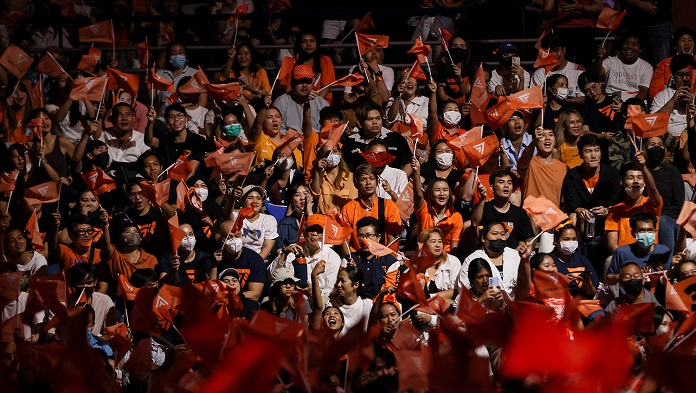The results of the recent Thai election are a slap in the face for the military junta, which has been in power since overthrowing the elected Pua Thai government in the coup of 2014.
Surprisingly, the Move Forward Party came top of the poll with 151 seats. Together with Taksin Shinawat’s Pua Thai Party, the two anti-military parties have 292 combined seats in the 500-seat parliament, while the two military-run parties only managed to scrape together 76 seats.
But the final outcome of the election is by no means certain. The military have 250 of their appointed senators on their side. The senate and the parliament sit together to choose the Prime Minister. This, together with other laws brought in by the military junta, can frustrate the democratic process.
Despite the Move Forward Party being described by some commentators as “extreme” and “radical”, it is a business-led party which has tried to reach out to younger voters. It has also tried to co-opt some sections of the labour movement.
It talks about reforming the military and building a “welfare state” but is short on details. Both Move Forward and Pua Thai are in favour of neoliberal free-market policies. There are no plans to abolish private hospitals and create a new public health service, either.
The mass movement for democracy which exploded on to the streets in 2020 was defeated, with the prosecution of hundreds of activists, while the energy from that movement has been channelled into electoral support for the Move Forward Party.
Even if Move Forward were to form a government, it would be constrained by Pua Thai’s conservatism and the Move Forward candidate for Prime Minister could be disqualified for holding some shares in a defunct media company. In the past, anti-military parties have been dissolved by military appointed judges and some politicians disqualified.
Drastic reduction
Neither Move Forward nor Pua Thai are proposing the basic democratic step of abolishing the draconian lèse-majesté law, which bars any criticism of the Thai royal family. This law is used by the military and the reactionaries to defend themselves and their authoritarian policies.
Many pro-democracy activists face numerous court cases, have been locked up or are in exile abroad because of this law. None of the mainstream parties propose the immediate release of political prisoners.
The election will do nothing to solve the crisis of smog and air pollution, which puts the lives of millions of Thai citizens at risk. No political parties are seriously considering a drastic reduction in private vehicles with a switch to electric public transport. Serious measures aimed at reducing forest fires, that also cause smoke and dust, are not being proposed either.
The issue of smog and pollution is linked to climate change. But none of the mainstream parties are proposing a “just transition” away from fossil fuels and a massive investment in renewables, especially solar power. The money for these measures could come from drastically reducing the military budget and abolishing the lavish budget for the monarchy.
Other serious issues which will not change are low wages, long working hours, poor trade union rights, the unequal influence of large corporations over land use, poverty in rural areas, lack of women’s abortion rights, the lack of rights for migrants and the Thai state’s war and repression against Malay Muslims in Patani.
The election result is to be welcomed but the only way to prevent another coup and to throw off the legacy of military rule is to rebuild a pro-democracy mass movement. In the past, young people have been very militant but they never really focused on the working class; often preferring small individualistic and symbolic actions.
If the military frustrates the formation of a Move Forward coalition, mass street demonstrations and strikes will be needed to beat back another coup.
Even if a Move Forward government is formed, a mass movement in the streets and workplaces will be needed to win fundamental democratic change in Thailand.
By Giles Ji Ungpakorn




